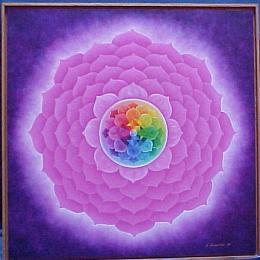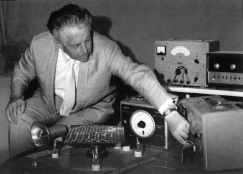
Sacred
Sounds / Healing Sounds
by Jonathan Goldman

Sound is among the most transformative and healing energies on the planet.
It can relax us and make us calm, or move us to great heights of emotion.
Sound can restore balance and harmony to our lives and make us healthy
and well. Conversely, sound also has the ability to adversely affect us
and bring our already stressed-out vibratory rates to new levels of imbalance
and disharmony. Why and how? What is the difference in the sounds that
make us healthy and those that distress us?
Sound can affect us on all levels - physical, emotional,
mental, and spiritual. Beneficial sounds for us
are often sounds that we consider "sacred." These
sounds seem to have the ability to charge and harmonize
us. There are reasons for this.
Knowledge of sound as a therapeutic and transformative
force is very old. The Ancient Mystery Schools of
Greece, Rome, Egypt, Tibet, and India had great
knowledge of sound as being the primary creative
force in the universe. The ancients knew what the
modern physicists now understand, that all is in
a state of vibration. "The World is Sound!" these
ancient mystics proclaimed, and indeed it seems
to be so.
If we examine the basic tenants of many of the
spiritual paths of the world, we find a commonality
in them. They all share the belief that the world
was created through sound. Here are but a few examples.
In Genesis, form the Old Testament, one of the
first statements is, "And the Lord said 'Let
there be light!"
In St. John, form the New Testament, it is written, "In
the beginning was the Word, the Word was with God,
and the Word was God."
From the Vedas of the Hindu tradition comes the
writing that, "In the beginning was Brahman
with whom was the Word. And the Word is Brahman."
The Ancient Egyptians believed that the god "Thot" created
the world by his voice alone.
In the Popul Vuh, form the Mayan tradition, the
first real men are given life by the sole power
of the word.
The Hopi Indian's story of creation tells of the
animation of all forms on earth by having the Spider
Woman sing the Song of Creation over them.
Many of us know of Pythagoras as the father of
geometry. However, how many are aware that in the
6th century B.C. in Greece, he had a school that
taught, not only the magic of numbers, but the healing
powers of music. Pythagoras taught of the Music
of the Spheres and how the movement of the heavenly
bodies could be perceived and reflected in the intervals
of plucked strings. Today, in the West, much of
this ancient knowledge has all but vanished. However,
we are now in the process of rediscovering that
wisdom, and adding to it through information and
understanding obtained from modern science. In Healing
Sounds, I discuss the spiritual and scientific understanding
of the application of sound as a transformative
and curative energy.
Perhaps the most profound scientific work showing
the power of sound to effect shape and form was
researched by Dr. Hans Jenny, a Swiss medical doctor
and scientist who spent ten years of his life examining
the effects that sound had on shape and formation.
Jenny photographed plastics, pastes, liquids, powders,
and other substances as they were being vibrated
by sound. The results of these experiments are truly
awe inspiring for they show extremely organic shapes
being created from inorganic substances merely be
exposing them to different sound frequencies. The
different substances, which were once blobs of inorganic
matter take on varying geometric form and begin
to look like living creatures: starfish, human cells,
microscopic life.

In his book, Cymatics, Dr. Jenny wrote: "Now
it is beyond doubt that where organization is concerned,
the harmonic figures of physics are in fact, essentially
similar to the harmonic patterns of organic nature...we
have the certain experience that harmonic systems
such as we have visualized in our experiments arise
from oscillations in the form of intervals and harmonic
frequencies. That is indisputable.
The Healthy Body
According to Dr. Jenny, harmonious shapes and harmonic
frequencies are interrelated. Through Jenny's experiments
and research we have proof that different sounds
create different forms. This phenomenon is one of
the basic principles of healing with sound, the
principle of "resonance." Modern physics
has verified that we are all vibrating atomic and
sub-atomic particles. Everything has a resonant
frequency, the frequency it most naturally vibrates
at. From the chair you may be sitting onto the pages
of this magazine. Every part of your body also has
a resonant frequency.
A concept of disease, observed by the ancients,
and now speculated by certain scientists such as
Itzhak Bentov in his book Stalking The Wild Pendulum
is that illness is an out of tune behavior of the
body. When something becomes diseased, it frequency
changes and it begins to vibrate differently than
it once did. Through sound, it may be possible to
apply harmonizing vibrations which will cause the
body to become in tune again.
In a healthy body, every organ, bone, tissue, and
other part is producing balanced frequencies that
create a healthy harmonic of the entire body. A
healthy body is like an orchestra playing a marvelous
and natural symphony, the "Suite of the Self." But
what happens if the third violin player from the
end looses their sheet music? They begin to play
the wrong notes in the wrong rhythm. The "Suite
of the Self" begins to sour and this is what
we call disease.
Continuing with this image, we find that traditional
allopathic medicine would probably cut off the head
of this violin player in order to alleviate the
problem. But what would happen if we could somehow
give this violin player back the sheet music? What
if we could project the correct resonant frequency
back into the imbalanced organ and allow it to vibrate
to its normal healthy frequency again?
Dr. Peter Guy Manners, a British scientist who
has created the Cymatic Instrument, which projects
sounds into the body for healing, describes this
phenomenon of resonant frequency healing this way:
"A healthy organ will have its molecules working
together in a harmonious relationship with each
other and will all be of the same pattern. If different
sound patterns enter into the organ, the harmonious
relationship could be upset...they may establish
their disharmonious pattern in the organ, bone tissue,
etc., and this is what we call disease. If therefore,
a treatment contains a harmonic frequency pattern
which will reinforce the organs, the vibrations
of the intruders will be neutralized and the correct
pattern for that organ reestablished. This should
constitute a curative reaction."
There is another concept which the ancients understood
and which will eventually be recognized by modern
scientists. This is the concept of "intention," the
understanding that sound has the ability to transmit
the intention of the one creating the sound to the
one receiving the sound. Intention is the energy
behind the sound. It is the thought and will which
we have when making the sound. If you are angry
or sad when making a sound, despite the frequency
of the sound (which creates its resonance), the
effect of the sound will convey anger or sadness.
Conversely, if we are happy or joyful when we create
the sound, its effect, regardless of the actual
sound being created, will be one of joy.
Kinesiology, a method of muscle testing used by
many holistic health practitioners, is one way to
measure the effects of intention. an angry or negative
thought, when coupled with a sound, will cause an
individual tested to become weak. The opposite occurs
when positive intention are projected onto sound;
individuals when tested become strong. Unfortunately,
kinesiology is not considered to be scientifically
valid and the medical community is a long way away
from recognizing the importance of intention in
sound creation. Yet the ancients knew of this importance.
Indeed, it was vital in the soundings of any frequency
which they wanted to call "Sacred."
In Healing Sounds there is a formula I have created
which incorporates this concept of intention as
an important aspect of healing with sound. It is:
Frequency + Intention = Healing With sacred sounds,
the intention of the individual making the sound
is to align with Divine Will and higher consciousness.
If the world began with the creator God or Goddess
making Sound, then the ultimate aim of sacred sound
is for the sounder to attempt to unite with this
Sound. It becomes "Thy Will" not "My
Will."
Sacred Sounds
Sacred sounds from different traditions can vary
extremely in their use of frequencies. These traditions
will often use very different tonal scales and rhythms
than we are accustomed to here in the West and we
may find these sounds extremely bizarre, out of
tune, and quite disharmonious. That is, until we
truly open our ears and our hearts to what is really
going on. Remember that when Westerners first visited
Africa, they reported that the Africans loved to
sing and dance, but unfortunately the Africans were
totally unmusical with no sense of rhythm. Nowadays,
we may hear Hindu Ragas, Tibetan Chanting, or Balinese
Gamelon music for the first time and feel very similar
reactions perceiving these sounds as totally unmusical.
However, once we get past this initial response,
we may find that these sacred sounds have extremely
transformational effects.
Dr. Alfred Tomatis, a French doctor, has spent
many years researching the sacred sounds of the
world. In particular, he has examined much sacred
chanting, including Gregorian and Tibetan. Dr. Tomatis
has found that many of the sacred sounds on the
planet are rich in high frequency sounds, called
harmonics or overtones. He believes that these sounds
charge the cortex of the brain and stimulate health
and wellness.
Harmonics, or overtones, are geometrically related
sounds that occur whenever a natural sound is created.
Harmonics are the sounds within all sounds, responsible
for the tone color or "timbre" of an instrument
and our voices. The mathematics of harmonics display
universal principles corresponding to an underlying
framework found in chemistry, astronomy, physics,
botany, and the study of other sciences. Knowledge
and understanding of these sounds seems to be quite
ancient, dating back to at least Pythagoras if not
before.
The use of harmonics as sacred sounds may be found
in many Shamanic and mystical traditions, particularly
Tibetan Buddhism and Mongolian Shamanism. Here the
sacred sound practitioner developed the ability
of creating multiple overtones or "Vocal Harmonics" and
singing two or more notes simultaneously. These
sounds were used by chanters as a means of invoking
different deities and energy forces and for balancing
the etheric centers called "chakras."
Listening to recordings of Tibetan Monks chanting
in this "One Voice Chord" can itself be
a transformational experience. The monks utilize
a fundamental frequency that is so deep, it seems
to be almost inhuman, like the growl of some wild
animal. Coupled with this tone is a much higher
voice which sounds like the voice of an angel singing
in harmony. These two sounds come from the same
being, a Tibetan Monk, and they are the result of
sacred sound practices.
The creation of harmonics is based upon vowel sounds.
The singing and elongation of these vowel sounds
is found in most of the major chanting in the world,
from Hindu and Tibetan mantras, To Sufi and Kaballistic
practices. For example we have "Oooooommm" and "Aaaaameen," Aaaaallaaah," and "Yaaaah
Waaaay." Through this form of "toning," extraordinary
resonance of the physical body and the brain occurs.
When the reciter of these sounds focuses an intention
of becoming one with the sacred sound, the results
are extraordinary.
In the Australian Aboriginal traditions, the sacred
sounds are produced by an instrument called the
Didgeridoo, a hollowed out tree limb. When it is
blown, using a technique called "circular breathing" (which
allows for the creation of a continuous stream of
air and therefore a non-stop sound), the result
is a single tone, very deep and extremely rich with
harmonics. Those of you who have heard this sound
may have found it very similar to the "Tibetan
Deep Voice," which is also very deep with distinct
overtones.
It is most interesting that these two very similar
sounds were created by two very distinct civilizations,
separated by many thousands of miles. Could it have
been, as their legends indicate, that the initial
human creators of these sounds first heard these
sounds in the dream state and then tried to create
them in the physical body, one using the voice while
the other using an instrument?
The chanting of a sacred sound coupled with the
intention of invoking specific beings or energy
forms may create what British scientist Rupert Sheldrake
called "morphic" fields. These are energy
fields that cause shape and form to occur. In many
of the sacred sounding traditions, the recitation
of the name of an entity will eventually bring forth
that entity and allow one to unite with it. Many
times the recitation of these sacred names are called "mantras" (a
Sanskrit word). However, this practice is found
the world over and is based upon an ancient understanding
of sacred sound. In many of the creation myths,
the Creator God or Goddess would think of an object
and then sound its name. The Being would first visualize
the object to create, placing intention upon this.
Then the Being would vocalize the sound of the object,
creating its frequency and bringing it into being.
Vocalization + Visualization = Manifestation
An example of this would be "Om
Mani Padme Hum," an invocation to the Avalokitesvara, the Buddha
of Divine Compassion. When coupled with the intention and visualization
of invoking this being, the vocalization of this chant will have the result
of producing a field of compassion. The Tibetans have a highly developed
(and extremely powerful!) practice of this in which they utilize extraordinarily
specific visualizations of entities in what are termed "mandalas." Whether
it is in the Sufi, Christian, Hebrew, or any of the countless other traditions,
including the non-tradition of shamanism, this sounding of the sacred names
of the Divine is utilized as a deeply spiritual practice to invoke the
Divine.
When we listen to recording of this type of sound,
if we are open enough to by-pass any strangeness
of language, tone, or frequency, we are often in
the frequency of the person making these sounds.
And if they are done with the correct intention,
we may be able to experience very transformative
results.
Usually, this sounding is very slow and repetitive,
creating a phenomenon known as sonic "entrainment" in
which the brain waves of the listener lock in resonance
with the brain waves of the chanter. This is one
way of creating altered states - by slowing down
our brain waves. Much sacred sound puts us in resonance
with frequencies that are within the alpha or theta
brain wave range, 7 to 12 Hz, and 4 to 7 Hz, respectively.
Many of the environmental sounds seem to resonate
to this spectrum of sound and particularly to a
frequency called the Schumann resonance, 7.83 Hz,
which may be the resonant frequency of the planet.
Many of the sacred rhythms of certain cultures,
particularly Native American, employ at their center
a heart beat which we entrain and match when listening
to. Our heart beat, respiration, and brain waves
will slow down due to the repetitive rhythms created.
However, another method of creating altered and
transformational states is to overdrive the brain
and put us into a trance state. This is true of
many of the polyrhythmic sounds of the sacred music
of Africa, Bali, and other cultures. The over-driving
of the psyche which occurs can energize us to the
point of what seems to be the loss of control. This
same frequency response can sometimes be experienced
walking down a crowded and noisy city street, but
the effect due to the intention may be very, very
different. One experience may be a heavenly, blissful
state due to the sacredness of the sounds while
the other may cause us to feel like we're in Dante's
inferno.
The difference between the two effects of the sounds
described above (the sacred rhythms versus the city
street noises) conveys the difference between the
sacred and the mundane. While it is possible that
any sound can be made sacred due to our intention,
most sounds are not. This understanding is particularly
important for those of us creating music. Through
understanding sacred sound as a vehicle for merging
and becoming one with the Divine, we can truly create
transformational energies that will benefit the
planet. While this knowledge has not yet reached
mainstream consciousness, many are becoming aware
of the power of sound. When this knowledge is restored,
music will be created and utilized for entrainment,
not entertainment, and sacred sounds will resonate
throughout the planet.
Sacred
Sounds / Healing Sounds |

